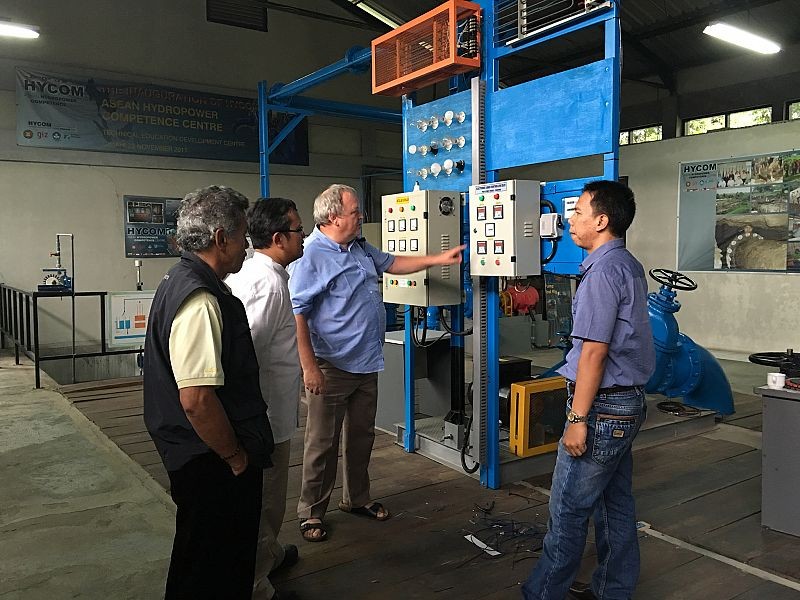The purpose of this exchange is to increase the technical and economic sustainability of micro-hydro projects.
 When comparing inherent aspects of different mini-grid technologies, micro-hydropower (MHP) has clear advantages: (a) far lower investment costs and levelized cost of electricity; (b) no need for battery storage; and (c) the reliable technology can be procured locally.
These advantages make MHP the most economically viable mini-grid technology for rural communities with agricultural-based productive end uses. However, most MHP projects generate excess electricity and operate at low plant load factors, which also leads to low levels of feed collection and to financial difficulties for many MHP projects. Most could achieve greater economic impact by technically and socially integrating quality technology that supports high productive end use.
The purpose of this exchange is to increase the technical and economic sustainability of micro-hydro projects. To that aim, a set of three knowledge-sharing tools will be developed to collect and systematise knowledge and experience from micro-hydro practitioners from South and South-East Asia. The tools will cover the following topics:
1. The Micro-Grid Code
This guideline document will set standards for environmental impact, civil construction, transmission and distribution, and electro-mechanical hardware.
2. Centralised Micro-Hydro Technology Database
This live database will make information about MHP suppliers accessible in all HPNET countries, including details that help to determine the standard of quality.
3. Training Module: Increasing MHP Load Factor
a. Simulation tools to help village stakeholders understand the need for the electronic load controller;
b. Indicator and monitoring device that assists households and developers to analyse and optimise their MHP usage;
c. Local workshop to test and refine the tools.
When comparing inherent aspects of different mini-grid technologies, micro-hydropower (MHP) has clear advantages: (a) far lower investment costs and levelized cost of electricity; (b) no need for battery storage; and (c) the reliable technology can be procured locally.
These advantages make MHP the most economically viable mini-grid technology for rural communities with agricultural-based productive end uses. However, most MHP projects generate excess electricity and operate at low plant load factors, which also leads to low levels of feed collection and to financial difficulties for many MHP projects. Most could achieve greater economic impact by technically and socially integrating quality technology that supports high productive end use.
The purpose of this exchange is to increase the technical and economic sustainability of micro-hydro projects. To that aim, a set of three knowledge-sharing tools will be developed to collect and systematise knowledge and experience from micro-hydro practitioners from South and South-East Asia. The tools will cover the following topics:
1. The Micro-Grid Code
This guideline document will set standards for environmental impact, civil construction, transmission and distribution, and electro-mechanical hardware.
2. Centralised Micro-Hydro Technology Database
This live database will make information about MHP suppliers accessible in all HPNET countries, including details that help to determine the standard of quality.
3. Training Module: Increasing MHP Load Factor
a. Simulation tools to help village stakeholders understand the need for the electronic load controller;
b. Indicator and monitoring device that assists households and developers to analyse and optimise their MHP usage;
c. Local workshop to test and refine the tools.
Projects with same technology
Empowering Rural Entrepreneurs in India
The project aims to demonstrate the viability of a hybrid hydro power plant consisting of a hydrokinetic turbine and photovoltaic panels to power a local rice and flour mill, while also enhancing the population’s wellbeing (e.g. by improved lighting).
Exchange: First Central American Conference of Small-Scale Hydroelectric Generators: Sharing Experiences and Coordinating Efforts for Efficient Management in Providing Clean Energy
To promote the exchange of knowledge and sharing of experiences between practitioners involved in small-scale hydroelectric projects
Projects in same country
Smart Grids for Small Grids
This project developed an open source load management system for community-based renewable energy systems.
Exchange: Waste to Wisdom: Supporting Biodigester Practitioners in South East Asia
This knowledge exchange activity aims to address the technical gaps in organisations in Malaysia and the Philippines by providing them with the skills to install and operate biogas digester systems efficiently and affordably.